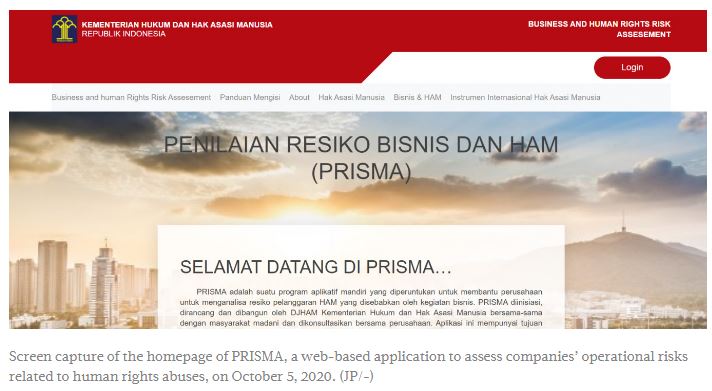Indonesia: Govt develops web-based app to assess businesses’ risks related to human rights
The Law and Human Rights Ministry is developing a web-based application called PRISMA to assess companies’ operational risks related to human rights abuses, from land affairs to deforestation and forced eviction to labor rights.
PRISMA will be a voluntary self-assessment that covers 11 indicators, namely a company’s profile, human rights policy, grievance mechanism, supply chains, manpower, labor condition, labor union, discrimination, privacy, environment and social responsibility.
“PRISMA is an independent app aimed at helping companies analyze the risk of human rights abuses from their business operations,” Bambang Iriana Djaatmadja, the ministry’s director of human rights cooperation, said in a virtual discussion on Monday. The app is issued in partnership with the Institute for Policy Research and Advocacy (ELSAM) and business groups.
The app emerged as the government’s response to the fact that out of thousands of overall human rights abuses, 15 percent were related to companies, according to Bambang’s estimate. The issues included land affairs, deforestation, forced eviction and labor rights.
The app development is taking place at a time when labor unions and advocacy groups are worried about the omnibus bill on job creation’s impact on labor rights. The bill will revise 79 prevailing laws and around 1,200 articles.
After having finished deliberating the bill, the House of Representatives passed it into law on Monday.
Businesses were second only to the National Police in terms of being reported for human rights abuses with 41 reports in August, according to data from the National Human Rights Commission.
PRISMA supervisor Patricia Rinigawati said the app was aimed at assessing not only big businesses, but also small businesses.
Patricia, who is also an academic at the University of Indonesia, added that the app was meant to educate businesses about, among other things, the United Nations Guiding Principles on Business and Human Rights (UNGP) and serve as a platform for due diligence.
“This is so we can identify the risks and we can minimize it or take measures to keep it from happening if it is preventable. If not, [companies] have to offer recovery to victims,” said Patricia.
She went on to say that running the app might require a more pragmatic approach so that it would not deter businesses from taking part in the assessment.
Danang Girindrawardana, the executive director of the Indonesian Employers Association (APINDO), said the app had a good method. However, he was afraid that it would overlap with prevailing regulations that had already asked companies to submit reports on similar indicators.
Asking companies to assess whether their suppliers’ practices comply with human rights regulations might be “an extraordinary boomerang” for small and medium enterprises (SME), some of which provided raw materials to larger businesses.
“We have to do this gradually. We cannot justify the risk checker’s responsibility to be imposed on big companies at this stage while they are obliged to help SMEs grow,” said Danang.
Source: https://www.thejakartapost.com/news/2020/10/06/govt-develops-web-based-app-to-assess-businesses-risks-related-to-human-rights.html


 Thailand
Thailand




